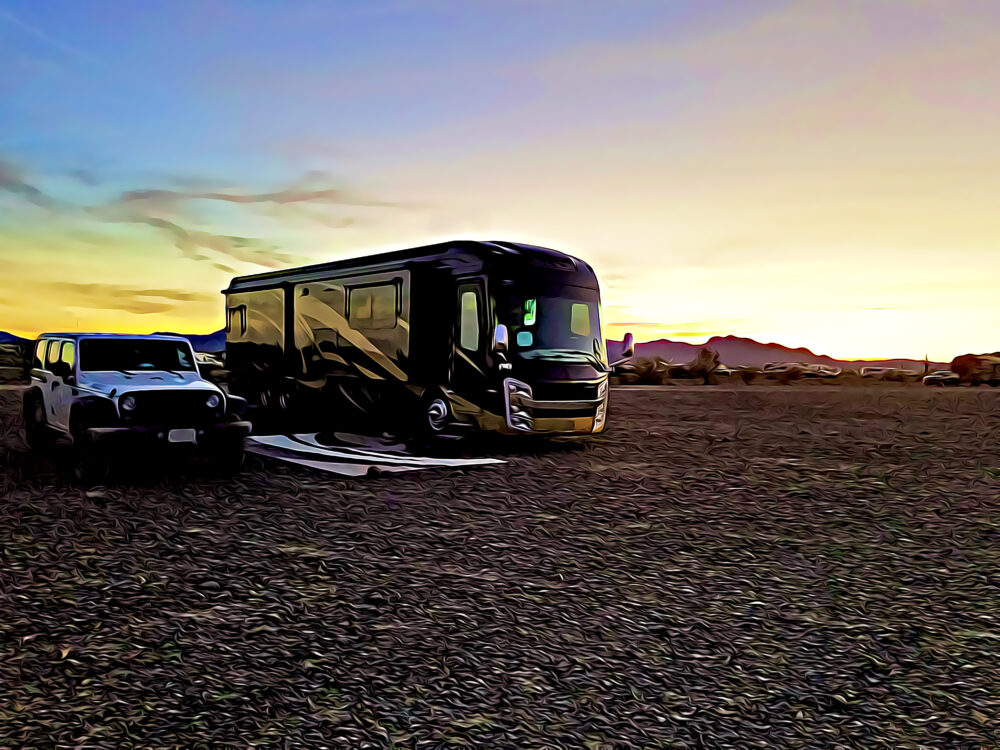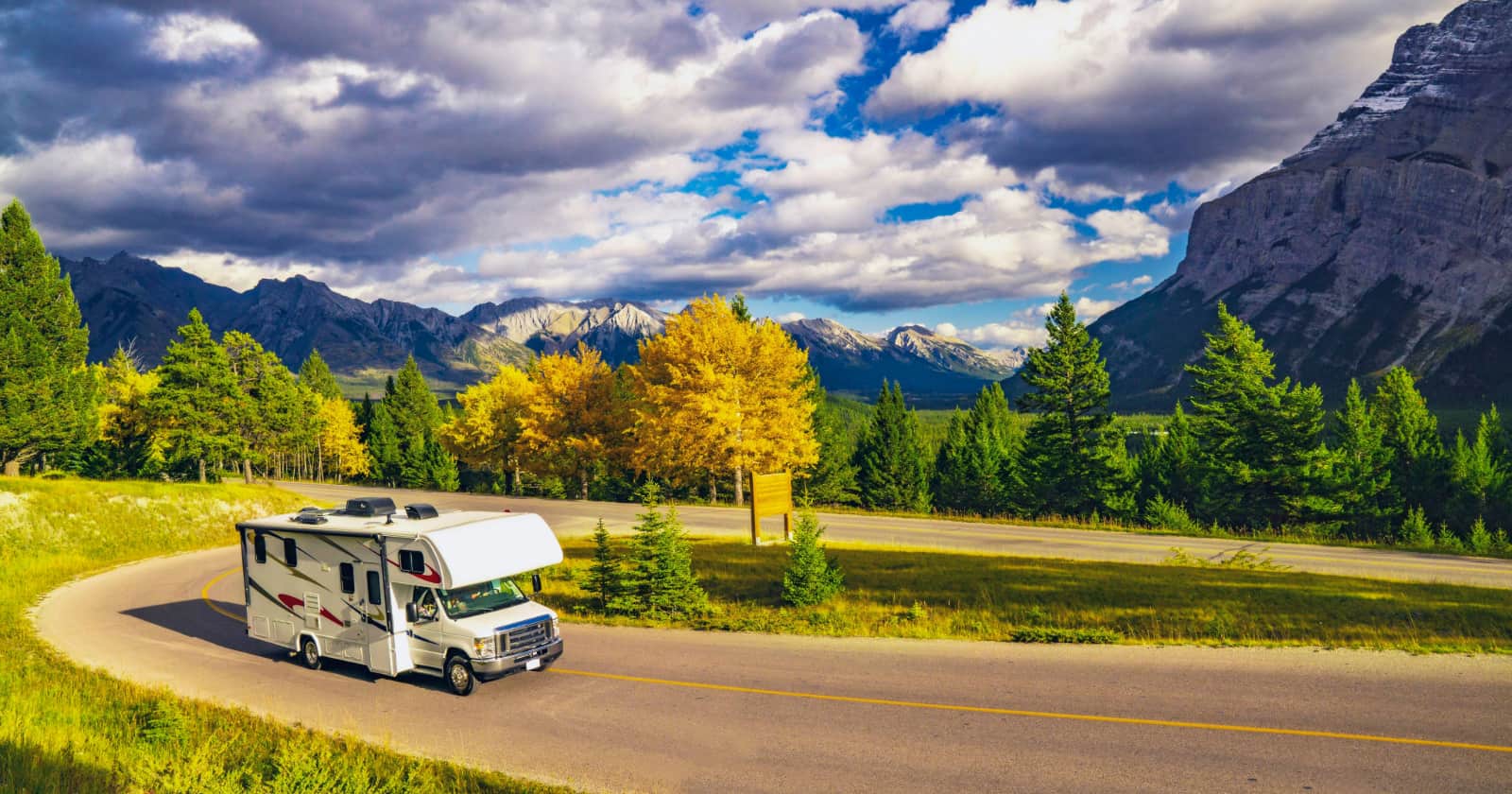
Can You Go Boondocking in a Class A Motorhome?
Camping in RV resorts or parks is a wonderful way to explore new areas. But sometimes it feels a bit cramped and artificial, especially if you stay in crowded parks. If you want to get out into the wilderness and connect with nature, you might want to consider boondocking!
This hookup-free style of camping is quite popular, and many people are curious about it. However, a lot of famous boondocking bloggers and influencers seem to live in compact vans or tiny trailers. This begs the question, can you go boondocking in a Class A motorhome?
Absolutely! Boondocking is available to everyone, no matter how large or small your rig may be. But there are a few pros and cons that come along with Class A motorhomes, so you should carefully weigh your options before you go off-road. We’ll break down everything you need to know before you take a big rig into the wild.
Benefits of boondocking in a Class A motorhome
Class A motorhomes are some of the largest and most comfortable models on the market. Boondocking in one of these vehicles can be a luxurious experience. Their increased size and wealth of amenities give them an advantage over smaller models. Some of the benefits include:
1. Large water tank capacity
Boondocking is also known as dry camping because you don’t have access to water hookups. You have to bring your own water with you, so the larger your holding tanks are, the better off you’ll be. This is where Class A motorhomes have a distinct advantage over smaller models!
These vehicles are often equipped with massive water tanks for fresh water, gray water, and black water. You’ll still need to monitor your water usage, but your stores can last much longer. Some Class A motorhomes even have tanks that can hold 100 gallons or more!
2. Cheap or free campsites
Another benefit of boondocking is the cost. Every RVer knows that campsites and RV resorts come with a price. This is especially relevant for those who own Class A motorhomes because these rigs often require large spaces. You may end up paying more than your neighbors if you travel in a big rig.
Boondocking solves this issue because it’s almost always free. There are plenty of public lands that permit dry camping. Even if you do need to pay a fee, it’s still much lower than an average campsite.
3. Lots of roof space for solar panels
Some boondockers opt for a completely electricity-free experience once they get out in nature. This is always an option, but Class A motorhomes come with lots of helpful amenities that you’ll probably want to use. In this case, solar panels are vital for charging your batteries while you’re away from hookups.
Class A motorhomes are ideal for solar panel installation because they have plenty of space on the roof. You can add permanent solar panels without worrying about the setup and take-down process every time you move. If you want to travel with extra panels, your rig should also have enough storage space to fit them.
4. Large storage capacity
Speaking of storage space, that’s another benefit of Class A motorhomes! These are enormous, and they have plenty of storage both inside and outside the vehicle. When you boondock, you need to carry lots of gear with you. This includes food, fuel, camping supplies, a generator, and much more.
Some people limit their living space when they pack their trailers to the brim. But with these massive motorhomes, you can pack everything you need while still enjoying a spacious interior. It’s a wonderful balance that lets you live comfortably whether you’re in the outdoor campsite or the indoor living space.
Drawbacks of boondocking in a Class A Motorhome
Although the size and amenities of Class A motorhomes can be helpful, they come with drawbacks too. There are several reasons that campers may opt for a smaller vehicle when boondocking. The downsides may influence your decision about whether to book a campsite or not.
Remember these factors before you pack up and hit the road!
1. Too bulky to go off-grid
Class A motorhomes are large, heavy, and long. This is perfect if you want a luxurious living space with plenty of storage! But it’s not so great if you want to go off-road. These vehicles are strong and sturdy, but they weren’t designed to travel on rugged trails.
It’s possible that you’ll get stuck as you travel to a remote camping destination. In the worst-case scenarios, your rig might even tip or flip over! These motorhomes aren’t easy to maneuver, so be careful when you plan your route.
2. Limited appliance usage
Solar panels and generators can provide electricity as you boondock, but the supply is limited. If you’re used to camping with electrical hookups, you might not consider how much electricity your motorhome consumes on a daily basis. Therefore, it’s easy to go over your limit without realizing it.
If you want to dry camp, you might need to go without some of your appliances. Identify the most important things you need and unplug everything else. You can also be thoughtful about your energy usage by switching off the lights and AC when you’re not in the room.
3. You may have to move around frequently
Although it’s free (or at least cheap) to boondock, this comes with a trade-off. Because you’re camping on public land, there may be rules that limit the length of your visit. Many RV resorts allow monthly or year-round camping, but you’ll have to move around a fair amount when you boondock.
The specific rules vary from place to place. Some locations might only allow you to camp for a single night, while others let you stay for two weeks. This can be annoying, especially if you want to settle in one place for a while.
4. Increased wear and tear on a luxury vehicle
Boondocking is a messy business. When you’re out in the wilderness, your vehicle is exposed to rain, wind, pests, mud splatters, and UV radiation. There are plenty of RVs that are built for these conditions, but Class A motorhomes aren’t usually on that list.
These are luxury vehicles that are designed for comfort and convenience. If you regularly take them off-grid, you’re likely to sustain damage at some point. The wear and tear results in higher maintenance costs. In addition, you may lower the resale value of your RV if you plan to sell it in the future.
Get RV-safe directions
You can boondock in almost any RV, regardless of its shape or size. Many people enjoy using Class A motorhomes because these vehicles allow them to live in comfort no matter where they are. The large storage capacity, huge water tanks, and premium solar capabilities are some of the main benefits.
On the downside, boondocking takes a toll on any vehicle, especially if it wasn’t designed for a rugged lifestyle. If you want to take these massive motorhomes dry camping, be prepared to limit your energy usage, move around frequently, and carefully plan your routes in and out with RV-safe trip planning tools like the RV LIFE App & RV LIFE Trip Wizard.
Related articles:



